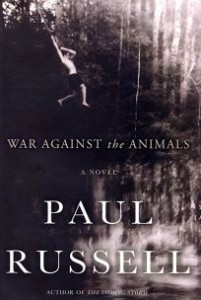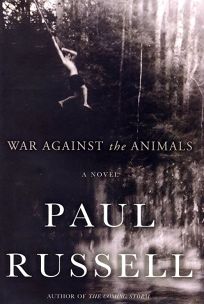 War Against the Animals
War Against the Animals
by Paul Russell
St. Martin’s Press. 358 pages, $24.95
THE PREMISE of Paul Russell’s fifth novel, War Against the Animals, quickly unspools to reveal a storyline that’s clearly intended to goose the reader’s sex drive. Cameron, a wealthy, middle-aged gay man, hires a pair of chiseled, blue-collar men—brothers, in fact—to renovate his dilapidated barn. With military haircuts, glistening, hairless bodies, and corn-fed good looks, both appear to have been plucked from central casting at Falcon Studios. Kyle is the crude, lewd older brother, Jesse the quiet, introspective younger one. Readers familiar with Paul Russell’s writing (Sea of Tranquility, The Coming Storm) will soon recognize in this novel the faint, persistent beat of loneliness and isolation that throbs through all of this author’s work.
“He wanted nothing from them but the proximity of their health and youth and watched them as a ghost might watch the goings-on of the living,” writes Russell, describing Cameron’s fascination with the brothers. Cameron, who feels newly revitalized after nearly succumbing to AIDS, is just as much an object of fascination for the brothers Vanderhof as they for him. A retired garden designer, Cameron Barnes is a Manhattan transplant who’s attempting to sink roots in the sleepy Hudson Valley town of Stone Hollow. Noticing that a spark seems to be developing between Cameron and Jesse, Kyle—who assumes that the attraction is one-sided—encourages his younger brother to befriend their employer to observe how “grateful” he’ll be for “somebody being friendly toward him.” Needless to say, Kyle has something other than Cameron’s happiness up his sleeve.
A fragile friendship begins to grow between Cameron and Jesse, literally sprouting up during their renovation of Cameron’s garden. Meanwhile, something else has begun to take root in town: a class struggle between the working-class native population and the wealthy gay men from New York who are gradually taking over the town. A mounting sense of panic and inevitability permeates the latter half of the novel as these two worlds collide, but the book wisely finishes on an ambiguous, wistful note.
Through subtle shifts in narrative point-of-view, Russell manages to create a story that is many things at once: a commentary on a clash of cultures, a coming-of-age story, and even a kind of ghost story in which the point is made that the past can continue to haunt the living until it is finally laid to rest.
___________________________________________________________
Tony Peregrin is a writer for the Windy City Times.






